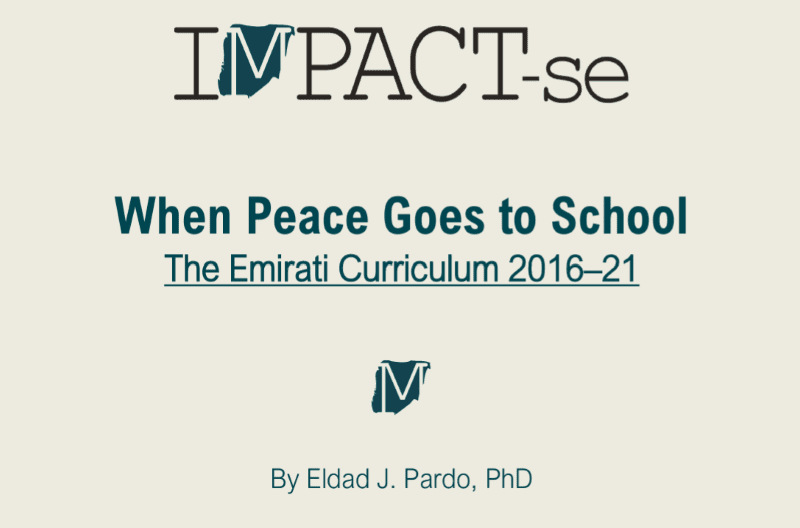An Israeli NGO gives the United Arab Emirates (UAE) high marks for mandating schoolbooks that teach tolerance, peaceful coexistence, and engagement with non-Muslims.
“The Emirati curriculum generally meets international standards for peace and tolerance. Textbooks are free of hate and incitement against others. The curriculum teaches students to value the principle of respect for other cultures and encourages curiosity and dialogue. It praises love, affection, and family ties with non-Muslims,” the 128-page study by the Institute for Monitoring Peace and Cultural Tolerance in School Education (IMPACT-se) concluded.
However, at the same time, the report appeared to hew closely to Israeli policy towards the UAE and, more generally, most states that populate the Middle East, which sometimes sees autocracy rather than greater freedoms as a stabilizing factor in the Middle East. Thus, the report skirts the issue of the UAE weaving the principle of uncritical obedience to authority into the fabric of Emirati education.
That principle is embedded in the teaching of “patriotism” and “commitment to defending the homeland,” two concepts highlighted in the report.
The report’s failure to discuss the limits of critical thinking and attitudes towards authority that may be embedded in the framing of education rather than in textbooks, raises the question of whether textbook analysis is sufficient alone to evaluate attitudes that education systems groom in their tutoring of successive generations.
The report notes positively that the textbooks “offer a realistic approach to peace and security,” a reference to the UAE’s recognition of Israel in 2020, its downplaying of efforts to address Palestinian aspirations, and its visceral opposition to any form of political Islam with debilitating consequences
The report notes that “support for the Palestinian cause continues but no longer [is] seen as key to solving the broader range of regional challenges. Radicalism and hate are the chief threat. Iranian expansionism is a threat.”
To its credit, the report implicitly states that Emirati concepts of tolerance are not universal, but subject to what the country’s rulers define as its national interests. As a result, it points out that “the People’s Republic of China is surprisingly described as a tolerant, multicultural society, which respects religions” despite the brutal crackdown on religious and ethnic expressions of Turkic Muslim identity in the north-western province of Xinjiang.
IMPACT-se further notes that the textbooks fail to teach the Middle East’s history of slavery. The report insists that the Holocaust and the history of Jews, particularly in the Middle East, should be taught but makes no similar demand for multiple other minorities, including those accused of being heretics.
The NGO suggests that the UAE could also improve its educational references to Israel. The report takes note that “anti-Israeli material has been moderated” in textbooks that teach “cooperating with allies” and “peacemaking” as priorities. However, UAE recognition of Israel does not mean that a map of Israel is included in the teaching materials.
To be fair, Israel may not yet feature on Emirati maps, but Jewish life is increasingly part of public life in the UAE. Kosher restaurants are open for business, as is a Jewish cultural center. Large menorahs were lit in city squares to celebrate the Jewish feast of Hanukkah in December, and a government-funded synagogue is scheduled to open later this year.
Meanwhile, Arab Jews who once fled to Israel and the West are settling in the UAE, partly attracted by financial incentives.






